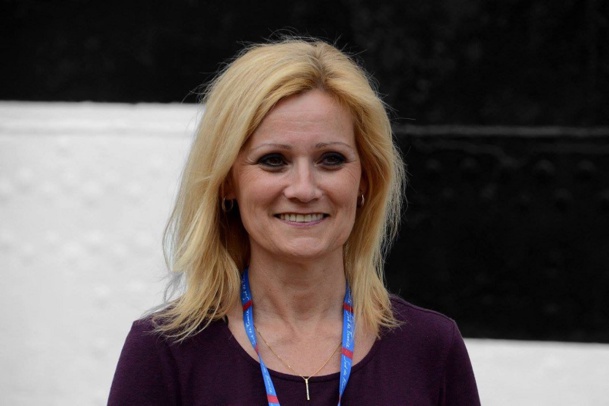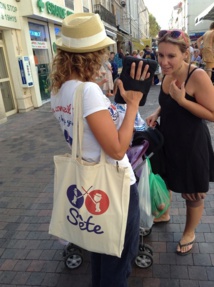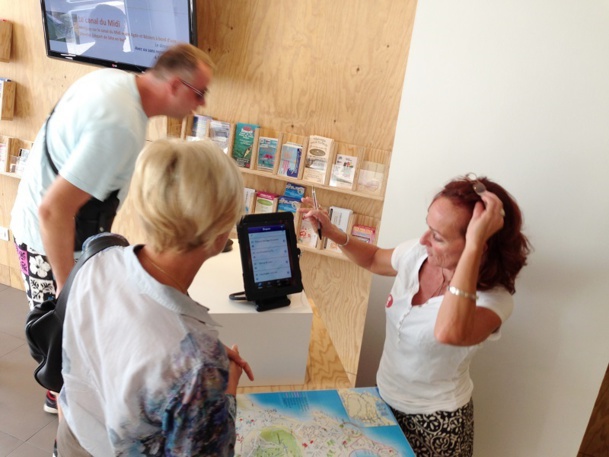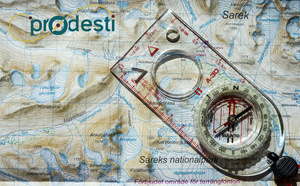
Emmanuelle Rivas, member of the National Prospective and Development Commission of Tourism Offices of France - DR : E. Rivas
i-tourisme: The digital revolution is the core of concerns and requires the development of innovative strategies. What are the new challenges for tourism offices?
Emmanuelle Rivas : “First of all, what’s a good tourism office? What are the visitors’ needs? The services? How to evaluate the efficiency of the destination? These are the questions at the core of the reflection we lead in the national prospective commission.
We’re seeing a hyper-customization of the demand. Tourists want to have a local experience, like the natives.
Offices are not the only entities that provide information anymore: because today, the tourist has to be informed, including through mobile devices. In turn, we thought about a hosting scheme and broadcasting plan on how to spread information.
Emmanuelle Rivas : “First of all, what’s a good tourism office? What are the visitors’ needs? The services? How to evaluate the efficiency of the destination? These are the questions at the core of the reflection we lead in the national prospective commission.
We’re seeing a hyper-customization of the demand. Tourists want to have a local experience, like the natives.
Offices are not the only entities that provide information anymore: because today, the tourist has to be informed, including through mobile devices. In turn, we thought about a hosting scheme and broadcasting plan on how to spread information.

In Sète, “enlightened advisors” are sent to the markets, beaches, and water shuttles to accompany tourists in the whole region - DR: OT Sète
The hosting agent has become a trip advisor.
Now, he has to evolve and provide “enlightened advice.” He can’t only work in the office.
In Sète, we send them to the beaches, water shuttles, markets, to be in direct contact with the public.
To confront such challenges, it is necessary to anticipate the evolutions and thus train personnel around the changes of digital technology (see box.)
i-tourisme: What uses do you foresee of these new technologies?
E.R.: “The use of tablets could be generalized.
It is such an efficient and simple way to facilitate contact between the tourist and the advisor! We have to show images, to ignite desire.
The adoption of responsive design for websites is paramount as it was done by OnlyLyon and Montpellier.
Or innovate like the office in Mulhouse did by launching the website jaienvie.de to adapt responses to the needs of tourists on location.”
Now, he has to evolve and provide “enlightened advice.” He can’t only work in the office.
In Sète, we send them to the beaches, water shuttles, markets, to be in direct contact with the public.
To confront such challenges, it is necessary to anticipate the evolutions and thus train personnel around the changes of digital technology (see box.)
i-tourisme: What uses do you foresee of these new technologies?
E.R.: “The use of tablets could be generalized.
It is such an efficient and simple way to facilitate contact between the tourist and the advisor! We have to show images, to ignite desire.
The adoption of responsive design for websites is paramount as it was done by OnlyLyon and Montpellier.
Or innovate like the office in Mulhouse did by launching the website jaienvie.de to adapt responses to the needs of tourists on location.”
“Wifi hotspots have been set up in different places”
i-tourisme: And Internet access?
E.R.: “The national federation of France’s Tourism Office launched the i-mobile option.
Wifi hotspots have been set up in different places, like in Apt, for the user to download the information he needs.
We can then access without internet connection: which is very popular amongst foreign tourists.
There are also digital terminals provided by the Tourism Offices, on which a visitor can be informed 24/7.
The company Andelia provides the Tourism Office in Dinan with an outdoor terminal.
And why not envision placing them in tourist places such as the Crocodile Farm!
One last unavoidable point: mobile applications. Digital circuits, of interpretation, understanding the landscape… and finishing up by a geolocation system made more accurate through the use of beacons.
We were testing in Sète’s tourism office the Next2U beacons to evaluate the reactions of this new technology.”
E.R.: “The national federation of France’s Tourism Office launched the i-mobile option.
Wifi hotspots have been set up in different places, like in Apt, for the user to download the information he needs.
We can then access without internet connection: which is very popular amongst foreign tourists.
There are also digital terminals provided by the Tourism Offices, on which a visitor can be informed 24/7.
The company Andelia provides the Tourism Office in Dinan with an outdoor terminal.
And why not envision placing them in tourist places such as the Crocodile Farm!
One last unavoidable point: mobile applications. Digital circuits, of interpretation, understanding the landscape… and finishing up by a geolocation system made more accurate through the use of beacons.
We were testing in Sète’s tourism office the Next2U beacons to evaluate the reactions of this new technology.”

At the Sète OT, Emmanuelle Rivas is attempting, with her team, to establish a true digital strategy to better welcome the tourist and advisor. DR: OT Sète
Invent new shared services
i-tourisme: How to coordinate and make such projects work?
E.R.: “Tourism is a collaborative economy that needs to be federated.
Players like Uber or JeLoueMonCampingCar cannot be seen like ennemies!
On the contrary, we must learn from them.
There are in some regions or cities, a true transportation problem: it seems to be important to considerate a similar alternative to that offered by start-ups that would invent new shared services.
Furthermore, will there still be in 2020 tourism data bases? Won’t we have user bases instead? Why not give them instead to local ambassadors?
Working together will enable to create new forms of tourism: “detox” stays in rural areas, develop business tourism and seminars in resort cities that are particularly popular in the summer season.”
E.R.: “Tourism is a collaborative economy that needs to be federated.
Players like Uber or JeLoueMonCampingCar cannot be seen like ennemies!
On the contrary, we must learn from them.
There are in some regions or cities, a true transportation problem: it seems to be important to considerate a similar alternative to that offered by start-ups that would invent new shared services.
Furthermore, will there still be in 2020 tourism data bases? Won’t we have user bases instead? Why not give them instead to local ambassadors?
Working together will enable to create new forms of tourism: “detox” stays in rural areas, develop business tourism and seminars in resort cities that are particularly popular in the summer season.”
“The Tourism Office is a company”
i-tourisme: You’re talking about tourism like a developing company…
E.R.: “On July 22, 2009, the law n°2009-888 applying to European Law was voted and allowed tourism to open to other mentalities.
Up to that point, offices were often seen as the public sector or competing with the private sector if they commercialized.
Since, offices often have their own DMC service to complement the offer of travel agencies and bring other clients to service providers.
The Tourism Office has become a company.
That of Sète offers a digital card called Sète Extra. It provides discounts and advantages to hosts or activity providers.”
i-tourisme: What is your vision of the Tourism Office of 2020?
E.R.: “It’s a package. The tourist doesn’t have frontiers, he moves, evolves. Elected officials have to integrate the necessary commercial dimension, and understand that he doesn’t stop at the administrative limits of the region.
Let’s stop being scared of data. With social networks and cookies, all of our information is already known.
Freeing this data will enable us to better communicate with our visitors and locals of our regions.
We’re always stronger as a team. Innovation will bring on growth.”
E.R.: “On July 22, 2009, the law n°2009-888 applying to European Law was voted and allowed tourism to open to other mentalities.
Up to that point, offices were often seen as the public sector or competing with the private sector if they commercialized.
Since, offices often have their own DMC service to complement the offer of travel agencies and bring other clients to service providers.
The Tourism Office has become a company.
That of Sète offers a digital card called Sète Extra. It provides discounts and advantages to hosts or activity providers.”
i-tourisme: What is your vision of the Tourism Office of 2020?
E.R.: “It’s a package. The tourist doesn’t have frontiers, he moves, evolves. Elected officials have to integrate the necessary commercial dimension, and understand that he doesn’t stop at the administrative limits of the region.
Let’s stop being scared of data. With social networks and cookies, all of our information is already known.
Freeing this data will enable us to better communicate with our visitors and locals of our regions.
We’re always stronger as a team. Innovation will bring on growth.”
The importance of learning digital technology
For Emmanuelle Rivas, training in digital technology is an essential step to create the future’s tourism office.
There already is the function of the Digital Facilitator of the Region that aids local players be more visible online.
Another of tomorrow’s profession could be that of experience designer: he would coordinate the client experience aggregated on the websites of tourism offices.
But training the personnel isn’t enough, it is essential to provide free wifi everywhere, and to help service providers in order to have a collective approach that balances between the digital strategy led by the tourism office and what DMCs offer.
For example, it has been essential that a store verifies that the informations given by Google be correct: tourists don’t only rely on the official website to know the store hours.
There already is the function of the Digital Facilitator of the Region that aids local players be more visible online.
Another of tomorrow’s profession could be that of experience designer: he would coordinate the client experience aggregated on the websites of tourism offices.
But training the personnel isn’t enough, it is essential to provide free wifi everywhere, and to help service providers in order to have a collective approach that balances between the digital strategy led by the tourism office and what DMCs offer.
For example, it has been essential that a store verifies that the informations given by Google be correct: tourists don’t only rely on the official website to know the store hours.

























![Chine : l'Année du Cheval de Feu fait chauffer les compteurs du tourisme [ABO] Chine : l'Année du Cheval de Feu fait chauffer les compteurs du tourisme [ABO]](https://www.tourmag.com/photo/art/large_16_9/94556459-65997162.jpg?v=1771331363)















